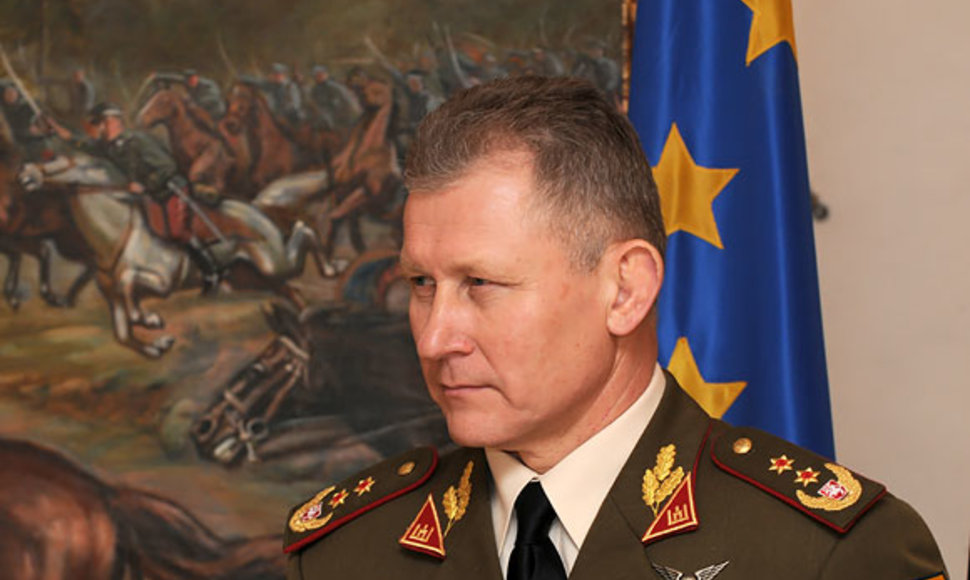In an interview to 15min, General Pocius shared his thoughts on Estonian ambition to have NATO air policing mission rotated among the three Baltic states, on miserable funding for the country's defence, on changes brought about in Afghanistan's Ghor Province by international efforts.
- Estonia seeks to have NATO air policing mission base rotated among the three Baltic states. What do you think of it?
Is there a point of doubling technical services and various projects [in Lithuania and Estonia]?
- (After an extended pause) I see it ambivalently. If Estonia opened a military airport, that would be good for the Baltic security. However, a thing that is being discussed at the moment is smart defence. If we are talking about smart investment of money and concentration of efforts and finances of several countries, we'd have to weigh everything very carefully. Is there a point of doubling technical services and various projects?
- In matters of defence, Tallinn has a strong argument against Vilnius – Estonia is assigning 2 percent of its GDP for defence in this year's budget, while Lithuania only 0.95-0.97 percent.
- The military must carry out its assignments with whatever financing it is assigned by a democratic government. Defence can be expressed by the number of citizens who choose to become soldiers and defend their country. They must be trained, equipped with modern weaponry and technology. It is a matter of attitudes. I do not wish to comment any further.
- In the upcoming NATO summit, there are plans to approve a goal of handing over control of military missions in Afghanistan to local forces. Is this transfer not a little premature?
- The process of responsibility handover to Afghanis is broken down into stages. Both ISAF (International Security Assistance Force) and Afghanis themselves evaluate each province separately. During the first stage, it was decided which ones were least threatened and which provinces Afghanis could control themselves. The second stage has been announced too – during it, parts of Ghor Province were handed to Afghan responsibility. Now, we are waiting for the third stage. I think the strategy works.
- Let's imagine that all Lithuanian troops currently deployed in Ghor Province leave tomorrow. Would Afghan forces be capable of dealing on their own?
The first phrase that comes to mind in Chaghcharan is “Welcome to the Moon.”
- I think they would. We have been working a lot with the local police which is the key institution in charge of maintaining order. There are the NDS (National Directorate of Security) and the ANA (Afghan National Army) that were established last year. Over the last year, our Police Operations and Training Group has trained a number of policemen for special assignments, other specialists worked with different institutions.
- The US and other countries are withdrawing troops from Afghanistan. Is there a risk of the Soviet pull-out scenario repeating itself?
- I believe that the story won't be repeated. The pull-out of the Soviet Union, that burned all the bridges behind, was a special case. One can say that the Soviets slammed the door: they broke off unfinished projects, construction of schools and factories. The current situation is different. All the ISAF countries are now talking about continuing support for local population – continuing civilian projects even after recalling troops, so that state and non-governmental projects remain in place.
- How has the province changed since you first set your foot in Ghor?
- As the troops used to joke, the first phrase that comes to mind in Chaghcharan is “Welcome to the Moon.” The environment does indeed remind of it: mountains, much dust, sand, a glimpse of near-invisible Chaghcharan from afar, medieval-looking clay huts and the Provincial Reconstruction Team (PRT) camp on plain field. The start was complicated in many ways – psychologically, logistically, operationally. We didn't know what awaited us.
I try to visit each Provincial Reconstruction Team and I always spot change. One of the most impressive moments was when I went to inspect the second or third PRT and saw Afghanis carrying mobile phones. It was the first time I truly realized that our presence there was not in vain. Currently, there are 16 million mobile service subscribers in Afghanistan, while there were none in Ghor in 2005. New buildings, schools, water-power plants, bridges have sprung up. There are paved streets and sun-powered street lamps in Chaghcharan. People used to come and wait for them to be turned on after dusk.
The runway in Chaghcharan Airport has been paved, infrastructure built, the airport security has been handed over to the police, they are building a navigation service. And it was not that long ago that aircraft had to land on gravel roads. There is a marked increase in passenger flow, number of flights.















